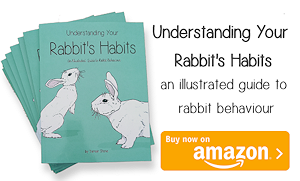Weight Loss Diet for Overweight Rabbits
Being overweight is very bad for a rabbit's health; it puts extra pressure on the joints and organs and makes grooming difficult. The goal for weight loss in rabbits is a slow steady decrease not a sudden drop. It's a good idea to weigh your rabbit weekly to monitor their progress. If you are unsure of your rabbit's ideal weight ask your vet for advice. Breed standards set weights for a breed ideal and most pet rabbits and many pedigree ones do not meet them so they should not be used as target weights. Learn more about monitoring your rabbit's weight here.
As with humans, weight loss is best achieved with a combination of a healthier diet and increased activity.
Hay
Hay (or grass) is the healthiest food for rabbit's it's what their digestion system is optimised for. As rabbits are 'designed' for eating grass which is low in calories, they easily put on weight when given too much food high in calories like pellets.
You rabbit should have an unlimited supply of hay, and eat lots of it. If your rabbit is reluctant to eat hay try different varieties and these tips on encouraging hay eating.
Grass is a great alternative to hay, and many rabbits that don't eat hay will eat fresh grass. Introduce it slowly and build up the quantity gradually so your rabbit's gut can adjust.
Alfalfa is sometimes fed alongside hay but it's higher in protein so should only be feed to rabbits that need extra calories such as growing babies. If you feed it currently then take it off the menu completely, if it's all your rabbit is used to you might need to swap gradually by mixing in grass hay.
Dry Food
Dry food is the biggest culprit when it comes to weight gain in rabbits. To start, check the nutritional information on the back of your packet, you want a protein level of 12-14% (12% is better if your rabbit is overweight) and a high fibre level (18%+). If your dry food is high in protein and low in fibre then you should consider changing brands - see here for a comparison.
The next big issue is quantity. Many rabbit owners over feed dry food; rabbit's only need a very small portion. Whilst your rabbit is dieting reduce dry food to approximately 10-15g per 1kg of body weight. It's a good idea to do this gradually so you ensure your rabbits hay intake goes up and their pellet intake goes down, particularly if your rabbit is a reluctant hay eater.
As rabbits generally consider dry food very tasty, it's an excellent way to incentivise exercise - they'll work hard to get it. There are many ways to do this. You could put the dry food in a treat ball so your rabbit has to roll it around to get the food out, scatter the food around the pen so your rabbit has to hop around and look for it, and put it on or under things so you rabbit has to nudge and jump. You can also hand feed it as a reward for training, for example encourage your rabbit to come when called and provide a piece of dry food for doing so. You can extend this by asking your bunny to jump on or over an object in exchange for the treat.
Fresh Foods
It's fine to continue to feed fresh foods whilst your rabbit is dieting. Most fresh foods are high in water so the portion of calories they contribute is quite small. If you are feeding a lot of fruits or root vegetables such as carrot and parsnip, which are high in sugar, then reduce these and replace them with leafy greens such as kale, herbs, carrot tops and dandelion.
If your rabbit doesn't currently have much or any fresh foods, you may like to introduce these as a substitute for the reduced pellets. They are very palatable, provide a wide range of vitamins and minerals and are a much healthier option than pellets. Remember to introduce new foods gradually.
Like pellets, rabbits will often be willing to put effort into obtaining fresh foods and you can use this to encourage exercise. For example, you can use a peg to hang leaves encouraging your rabbit to stretch to reach them.
Treats
There is no reason to give up treating your rabbit, but you may need to change what foods you are treating with. Many store bought treats are high in sugar and fat and can play a big part in weight gain. Luckily there are many healthy options that rabbit's love the taste of.
You can turn your rabbit's normal dry food into the 'treat' just save a portion of their daily ration to feed by hand. Alternatively you could make your own treats, here is a recipe.
Fresh foods are also good to use as treats, a sprig of fresh herbs usually goes down very well or a small cube of carrot or apple.
Exercise
Exercise is a key part of weight loss. Your rabbit will need the space and incentives to get active. Think about how large your rabbit's living accommodation is and the amount of exercise time they get. Rabbit's should have access to a minimum run size of 8'x4' but a larger area for extra periods of exercise (for example running around your living room for an hour each evening) is a great way to boost their activity levels.
Rabbit's won't run laps for the fun of it, so you need to give your rabbit a reason to move about for example by providing toys, tunnels and new objects to examine.















